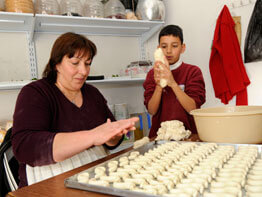BEIT SAHOUR, West Bank – When the Christmas season comes around, Nadia Bannourah pushes back the living room sofas, removes the coffee table and drags over the big kitchen table in its place.
Then she sets her family to work making Christmas cookies. Mixing margarine, semolina, yeast and boiling water with her hand, she begins the process.
A shift nurse at Caritas Children’s Hospital, Ms. Bannourah, 48, is among about 25 women in the Bethlehem triangle area – Bethlehem, Beit Sahour and Beit Jalla – who have turned their culinary talents with the intricate Palestinian holiday cookies into a source of income over the past decade.
During the holiday season – which includes the Catholic and Orthodox Christmas celebrations and this year the Muslim holiday of Eid al-Adha – the family of six produces more than 300 pounds of cookies. Most of the cookies fill orders from local shops, but Ms. Bannourah also takes individual orders.
For smaller orders, the six family members take a post around the table in the kitchen and form a production line. All the baking and shaping is done in the evening when Nadia Bannourah, who is Greek Orthodox, returns from work.
Nothing is done unless Nadia Bannourah is at home, said her husband, Emile Bannourah, 57, a retired teacher.
“This helps pay for the university for my children and the private (Catholic) school for the younger ones,” said Nadia Bannourah. “It’s good extra money.”
In Bethlehem, when Evelyn Zarrouk’s husband had to stop working for health reasons about 12 years ago, she took stock of her skills and tried her luck at baking. She never had a paying job before.
While most of the year she and her husband, who are Catholic, run their little basement bakery on their own, at holiday time they employ four women to help.
To make the cookies, they knead the semolina dough, shape the cookies and stuff them with date puree, ground pistachios or a mixture of walnuts, cinnamon and sugar for the “maamoul” cookies. They also form the rounds with a butter dough and stuff them with ground almonds or pistachios, or form the dough into an “S” shape for the “Gharabe” cookies.
According to Christian Palestinian tradition, the small rounded and decorated doughnut shape of the date “maamoul” is representative of the crown of thorns placed around Jesus’ head before his crucifixion, while the nut mixture symbolizes the sponge used to give Jesus sour wine during his crucifixion.
The recipe for the cookies has been handed down from generation to generation, she said.
Over at the Zarrouk house, the strains of “Jingle Bells” can be heard from the radio, and the women laugh as one of them gets up to do a little dance.
“It is a very happy time,” said Norma Slieby, 47, Evelyn Zarrouk’s sister-in-law, as she rolled out date-filled dough into sesame seeds. “We talk and laugh and nibble on the sweets.”


